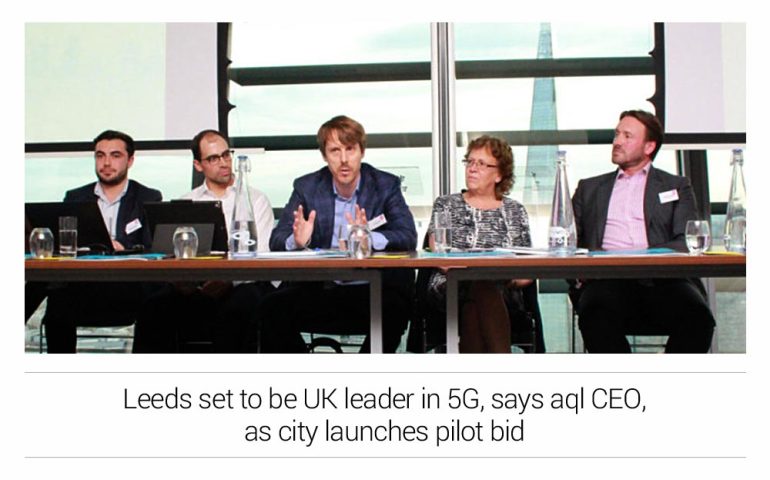Leeds set to be UK leader in 5G, says aql CEO, as city launches pilot bid
As Leeds launches its bid to become a national testbed for 5G, Prof. Adam Beaumont reveals why Leeds is uniquely positioned to be the UK’s leader in next-gen communications.
Speaking at Leeds in London, Beaumont, founder and CEO of aql, explained how, over the last 10 years, the company has been quietly building the fundamental infrastructure for low-latency, low-rated, high-capacity connectivity in Leeds – creating the perfect ecosystem for 5G.
Alongside its thriving tech community, Leeds is the only city in the UK where the main data hub lives right at its heart, and the only city outside London with a fully-independent internet exchange point, IXLeeds. Leeds is also home to the main Northern internet hub for universities, colleges and teaching hospitals both in the region and nationally. Beaumont built the datacentres providing the hub for this connectivity and also co-founded the internet exchange itself.
Beaumont said: “When we first set out to build the infrastructure in the city, we made a fundamental architecture choice – to build a datacentre in the very heart of the city. Usually datacentres are built out-of-town. This has catalysed the creation of a hub which sits on the shortest path to the city stakeholders.
We’ve worked for the past decade to connect the key stakeholders in the city at sub-millisecond terabit speeds, including the key academic community. We also house the internet exchange and the tail-ends of many of the region’s dark-fibre networks, critical for enabling the next step change in technology. This low-latency engineering allows the city to best leverage high-speed decision-making technology such as driverless cars. The shorter the data path, the faster the decisions or safety checking can be carried out.
aql is known by many as a hidden enabler – its platforms provide the communications connectivity to the growing Internet of Things (IoT) market, having enabled hundreds of thousands of devices in marine, transport, health and retail. The opportunity to take this into the autonomous vehicle space is an exciting next step.”
Alongside transportation, perhaps the field with the most potential for 5G innovation is healthcare. “5G could transform the digital aspects of healthcare, and really open up the mobile health markets in particular” says David Jayne, professor of Surgery at the University of Leeds.
Adds Jayne: “One thinks of at-home patient monitoring for assessing fitness for surgery and stratification of resources through to postoperative at-home monitoring – saving hospital beds, increasing efficiencies, and saving costs through reduction of readmissions.
In the surgery-related disciplines, 5G-enabled at-home monitoring of chemotherapies and complications, and at-home physiotherapy with built-in monitoring of compliance with treatment, will bridge the gap between primary and secondary care to provide a seamless service.”
Leeds in London is the first in a planned series of events in the capital, bringing together business and thought leaders from the region to make the case for Leeds’ bid for investment from the Department for Digital, Culture, Media and Sport (DCMS) to become a pilot city for 5G.
“Leeds is uniquely placed to be at the forefront of the fantastic opportunities that 5G rollout offers. From business improvements to how we live our daily lives, 5G is a catalyst for growth and opportunity,” said Tom Riordan, chief executive of Leeds City Council.
Read Leeds’ Why 5G in Leeds? prospectus here.


